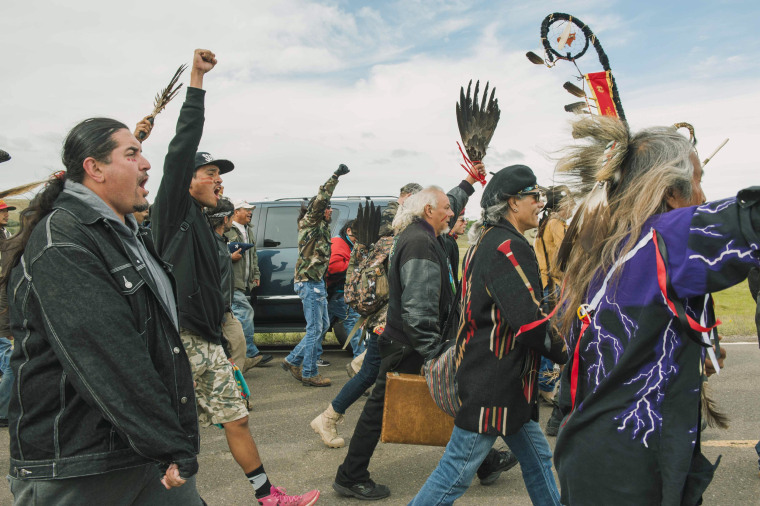A federal judge ruled Friday against a Sioux tribe’s request to halt work on a North Dakota oil pipeline, a project the tribe says threatens to destroy its ancient, ancestral lands.
U.S. District Judge James Boasberg in Washington denied the Standing Rock Sioux Tribe's request for a temporary injunction in a one-page ruling. It ordered the parties to appear for a status conference on Sept. 16.
But federal authorities quickly announced they would not allow work on the Dakota Access Pipeline to proceed on federal land near or under Lake Oahe pending more reviews of previous environmental decisions, and said the case highlights a need for more discussion on infrastructure projects near tribal lands, and possibly reform.
The U.S. Army Corps of Engineers, the Justice Department, and the Department of Interior also asked the pipeline company to "voluntarily pause all construction activity within 20 miles east or west of Lake Oahe"
The judge's decision comes after weeks of protests at the site of the proposed pipeline just a half mile from the Standing Rock reservation, which straddles the North and South Dakota border. Part of the pipeline would traverse the Sioux's lands and run under the Missouri River, the tribe's sole water source.
Boasberg said in a memorandum opinion said "this Court does not lightly countenance any depredation of lands that hold significance to the Standing Rock Sioux" but that the tribe had not demonstrated an injunction was warranted.
The protests forced a halt in construction last month after the tribe sued the U.S. Army Corps of Engineers, which has jurisdiction over the land, arguing that it did not adequately consult with them before granting Energy Transfer Partners fast track approval in July.
Related: North Dakota Protesters Vow to Stop Oil Pipeline Traversing Sioux Land

The Army Corps of Engineers said it did not oppose the suspension.
The Corps of Engineers said in the statement that while it appreciated the judge's ruling it did not violate the law, "important issues raised by the Standing Rock Sioux Tribe and other tribal nations and their members regarding the Dakota Access pipeline specifically, and pipeline-related decision-making generally, remain."
The federal agencies said in a joint statement that Native American tribes would be invited for discussions on the issue of projects on or near tribal land.
"This case has highlighted the need for a serious discussion on whether there should be nationwide reform with respect to considering tribes’ views on these types of infrastructure projects," the statement said.
The protests have drawn thousands to the site and the pipeline has become a hot button issue in America's Indian Country and opened a wider national debate on corporations' ability to encroach on Native American lands.
Of the Bureau of Indian Affairs' 566 federally recognized tribes, nearly 250 tribes have stood in solidarity with the Standing Rock Sioux at Cannon Ball, North Dakota — the site of the Oceti Sakowin Camp — with a rate of 10 tribes joining by the day, according to Dave Archambault, Chairman of the Standing Rock Sioux Tribe.
The Dakota Access Pipeline, which is already more than half completed, is a massive $3.7 billion project that would transport 470,000 barrels of oil a day across four states from the oil fields in Stanley, North Dakota, near the Canadian border, to Patoka in southern Illinois, where it would link with other existing pipelines.
The project is financed by the Dallas-based Energy Transfer Partners, which claims it will bring millions of dollars into local economies and create an estimated 8,000 to 12,000 construction jobs.
Energy Transfer Partners has sued several protesters, claiming they in some cases threatened and intimidated company-hired contractors who were working at the site.
Members of the Standing Rock Sioux Tribe see the pipeline as an environmental and cultural threat to their homeland. They say an oil spill would permanently contaminate the reservation's water supply and that construction of the pipeline would destroy lands where many of their ancestors are buried.
The tribe's fears of a spill seemed to gain further credence last month when the Bismarck Tribune reported that the pipeline's original proposed route over the river north of Bismark was rejected over fears that a potential spill could threaten that city's water supply.
Chairman Archambault told NBC News following the federal judge's decision that the tribe was "looking at all our legal options that are available to us." He vowed to carry on his tribe's protest at the camp site, which he said had "sparked a movement amongst our people."
"We're in it for the long haul," said Archambault. "We're going to continue to move within the court system to ensure that indigenous rights and indigenous peoples' rights to their lands are protected."


